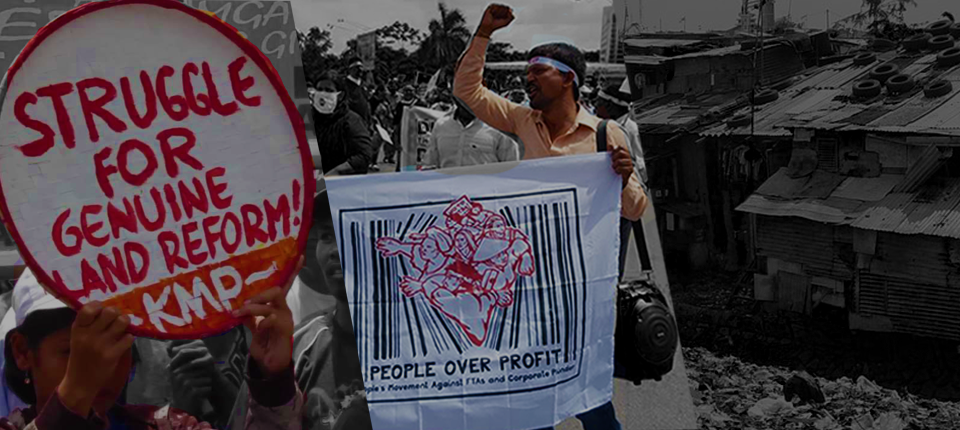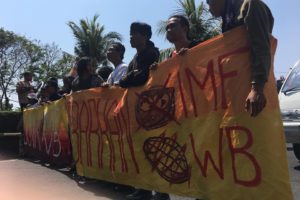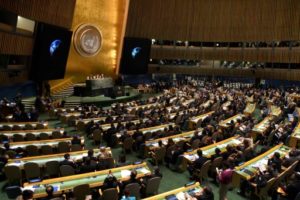[[{“type”:”media”,”view_mode”:”media_original”,”fid”:”1986″,”attributes”:{“alt”:””,”class”:”media-image”,”height”:”430″,”style”:”width: 600px; height: 269px;”,”typeof”:”foaf:Image”,”width”:”960″}}]]Photos courtesy of Peasant Movement of the Philippines (Kilusang Magbubukid ng Pilipinas), People Over Profit, Wikimedia Commons. With CC BY-SA 2.0 license.
This was originally published in TeleSUR English. You can read it here.
Last month’s Oxfam report tells a story of worsened economic inequality, with the world’s richest 1% capturing 82% of wealth in 2017 and no increase for the bottom 50 percent. Monopoly power, crony capitalism and inheritance, according to Oxfam, are responsible for two-thirds of the wealth of the 2,043 billionaires in 2017.
What does monopoly power look like today? 134 of the top “Fortune Global 500” companies, which tend to dominate their respective industries, are headquartered in the United States in 2016. Look at Apple in technology and Lockheed in the defense industry. Most, if not all, of them are transnational corporations (TNCs) that operate in other regions through, for example, subsidiaries or through “subcontracting” production.
In 2015, the top 10% corporations captured 80% of profits, according to McKinsey Global Institute. The ever-increasing shareholders’ profits of corporate monopolies, whether in tax havens or not, are at the expense of Southern workers who labour at “race-to-the-bottom” wages in precarious conditions. One grim example occurred in 2013 when a weakened Bangladeshi factory complex collapsed, killing more than a thousand workers, many of whom are women. The factory supplied US corporate giants such as Walmart.
In increasing corporate concentration, elite-led states are anything but off the hook. People’s movements have been long aware of states’ role in strengthening corporate monopoly power, through manoeuvring of public policy for business interests that entrench existing or new monopolies.
Monopolies are entrenched not only “at home” since these corporate giants expand their reach – monopoly capital’s reach – to other regions with natural resources and generally lower labour costs. Southern movements have seen the joint trajectory of elite-led Southern states and international finance institutions (IFIs) towards neoliberalism, to the benefit of TNCs.
Conservative estimates by the World Bank Group (WBG), one of the big IFIs, show how 80% of the 767 million poor people live in rural areas in 2013. This would likely increase, if we reject the bank’s assumption that workers and farmers are already “non-poor” if they earn above USD 1.90 to 3.10 per day. When it comes to total wealth and assets, the WBG also admits inequality, with wealth per capita in rich countries being 52 times greater than in low-income countries.
Apart from these, such WBG reports on inequality have not prevented the Bank – with the International Monetary Fund (IMF) – from pushing looser regulation, liberalised and privatised economies that prioritised big private sector over people. According to a 2015 research involving 123 countries from 1985 to 2002, IMF and World Bank loans and their state-implemented “policy reforms” worsened the state of collective labour rights.
The complicity of elite-led Southern states, meanwhile, does not end with locking in these neoliberal rules. They also use state repression against small producers. Seven out of 10 cases of land rights-related violations in 2017 involved police, military and paramilitaries, according to Pesticide Action Network-Asia Pacific. Leading the list is the elite-led state of the Philippines. The land conflicts often involved mining companies, plantations, or infrastructure and energy companies.
Economic inequality is an effect of this political-economic status quo. TNCs are this system’s agents, attacking people’s collective rights and capturing economic resources. Economic inequality, at the grassroots, means persisting landlessness of small farmers due to agribusiness land grabs, through “legal” means or militarism. It means the loss of indigenous peoples’ ancestral domains due to extractive TNCs’ mining of minerals. It means seas and fishing zones dominated by the ships of big companies; workers forced either to engage in unjust employment in their countries or being migrant workers.
Economic inequality is when Freeport Indonesia (an Indonesian subsidiary of the US firm Freeport-McMoran) gets to plunder West Papua through mining, or when the Swiss TNC Glencore (top 16 in the Fortune Global 500) does it in the Democratic Republic of Congo. In Brazil, where the top 3% owns almost two-thirds of arable land, and the US insurance firm TIAA has linked up with a Brazilian sugarcane company to convert farmland into even more sugar plantations.
The news about widening inequality sprung in time for the gathering of big business and state bigwigs in Davos. People’s movements must not stop there, for there is a need to focus on how neoliberal finance institutions still play big roles today. The IMF and the WBG continue to hold their regular meetings with the same neoliberal model at their core, despite admissions of faults (by IMF economists) or a rhetorical appeal to combat inequality (by both).
The institutions of the WBG continue to empower TNCs and big private sector. Its International Finance Corporation (IFC) has promoted so-called “public-private partnerships” for infrastructure and utilities, which is a de facto privatisation of what should have been public services. This is aside from the IFC’s role in pro-TNC policy advice, on pretexts of creating “attractive investment climates” in the Global South.
The Multilateral Investment Guarantee Agency (MIGA) continues to function as protection of corporations’ profits in times of political crisis through insurance. The International Centre for Settlement of Investment Disputes (ICSID) continues to be a go-to body in free trade agreements, with investor-state dispute settlement clauses that give TNCs the scandalous power to sue governments for profit losses.
Shifting away from the interference of these neoliberal institutions, and neoliberal policy in general, is needed to combat poverty and inequality. There is also the need to pull at inequality’s more systemic roots: the activities of monopoly capital in the Global South through TNCs, with the complicity of elite-led governments from the Global South and North, as strengthened by the norms set by international finance institutions.
We do need greater regulation, but we also need more drastic changes in Southern economies, towards land reform and rural development along with strategic industrial policy that is not centred on foreign investors and TNCs. Needless to say, development should be people-led and people-centred, with communities and grassroots organisations in the Global South at the core. Those who bear the burden under the current economic system play an important, if not the most essential, role in challenging the roots of inequalities.
First, people’s organisations and movements have a crucial role in uplifting peoples’ conditions through asserting collective rights over resources. This means asserting smallholder farmers’ right to land and subsistence fishers’ right to water resources. This also means workers demanding their right to full employment and just wages, and indigenous peoples their right to ancestral domains and self-determination.
Second, peoples – especially the poor and marginalised in the Global South — have the important task of asserting their economic and political sovereignty even outside dominant institutional processes. Forming movements and organisations whenever necessary, they should challenge corporations and states that attack people’s rights, challenge the hold of international finance institutions and anti-people trade agreements.
Finally, they need to take back economic power, and resist the global monopoly-led economic system that contributes a large part to worsening inequality.
Amy Padilla is the new Director of IBON International (www.iboninternational.org), a Southern international non-government organisation that engages in capacity development for people’s rights and democracy around the world.



